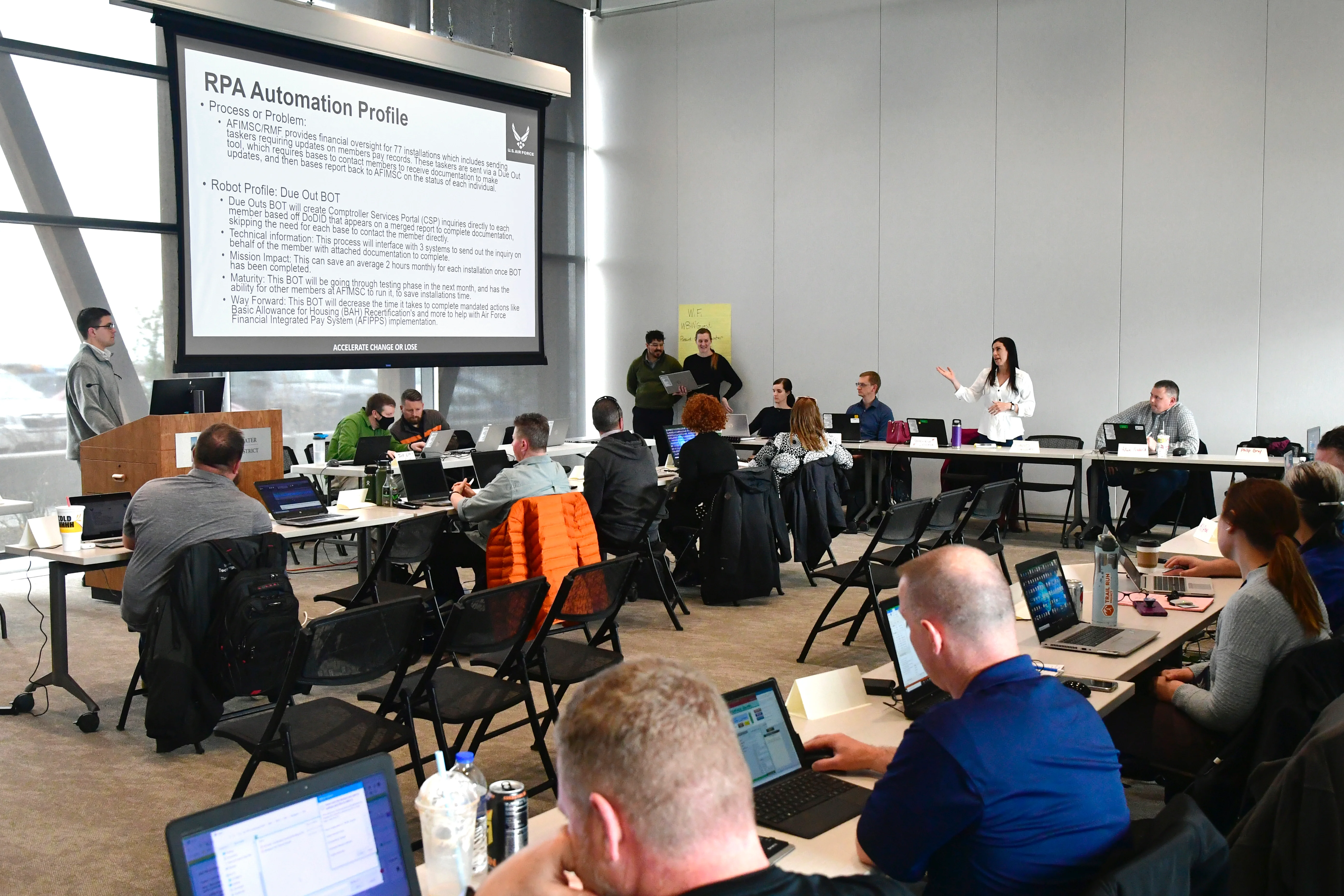
Imagine if corporate training wasn't just a checkbox on your to-do list, but something lively, personal, and super effective. That's what corporate training automation brings to the table. A recent study shows that companies using automation in their training see a 30% boost in employee engagement and retention. Pretty impressive, right? In our fast-moving digital world, automation is changing how businesses think about employee growth, making learning easier to access and more suited to what each person needs. With AI shaping content and tracking progress in real-time, the options are vast. Looking ahead, it's clear that automation isn't just a passing fad—it's a big change. Let's see how these new technologies are set to shake up the corporate learning scene and tackle the questions you might be wondering about!
Summary: This article discusses the impact of automation on corporate training, highlighting its transformative role in enhancing training efficiency and effectiveness. It answers frequently asked questions about how automation is reshaping learning and development in organizations.
The Transformative Role of Automation in Corporate Training
Corporate Training Automation: Streamlining Learning Processes
Corporate training automation leverages technology to streamline and enhance employee training processes. It automates repetitive tasks such as course assignments, tracking progress, and sending reminders, thereby improving the efficiency of training programs. Typically, this is achieved through a Learning Management System (LMS), which serves as the central platform for managing and delivering training. Employees can learn at their own pace, from any location, provided they have a device and internet access. This setup ensures seamless business operations and facilitates continuous learning without the need for physical presence. For example, a company might use an LMS to automatically assign mandatory courses and track completions, significantly reducing manual workload.

Technologies Powering Corporate Training Automation
Several technologies are crucial in automating corporate training:
Learning Management Systems (LMS) in Training Automation
LMS platforms are the cornerstone of training automation. They facilitate course delivery, progress tracking, and automatic notifications. Learners can access content, complete assessments, and receive feedback all in one place, streamlining the training process.
Role of Artificial Intelligence in Training Automation
AI customizes learning paths by recommending courses tailored to individual needs and preferences. It suggests specific training for employees based on their roles and performance. Additionally, automated quizzes provide instant feedback, keeping learners engaged and enhancing comprehension.
Automated Quizzes and Assessments for Enhanced Learning
These tools offer immediate feedback, essential for maintaining learner interest and understanding. Automated assessments quickly evaluate progress, making learning more interactive and responsive.
Advantages of Automation in Corporate Training
Automation offers numerous advantages for corporate training:
Time and Effort Savings through Automation
Automation significantly reduces time and effort by eliminating manual tasks and resolving scheduling conflicts. This is particularly beneficial for onboarding, where automation manages emails, manuals, and training deployment, providing new hires with a faster, more consistent start.
Ensuring Accuracy and Data Integrity with Automation
Automation minimizes human error in tracking training outcomes and certifications, enhancing data accuracy and reliability. This is vital for compliance and ensuring employees meet training requirements.
Enhancing Learner Experience with Automation
Automation enriches the learning experience by offering personalized paths and rapid feedback from assessments, leading to increased engagement and better information retention.
Cost Reduction through Automated Training Solutions
Automation lowers training costs by reducing the need for instructors, travel, and materials. This makes training more scalable and efficient, allowing organizations to allocate resources toward strategic goals.
Revolutionizing Corporate Training with Deepbrain AI and AI Studios
Deepbrain AI and AI Studios are transforming corporate training by incorporating AI tools that expedite content creation and personalize learning.
Transformative Impact of Deepbrain AI on Training
Deepbrain AI offers tools for rapid training content creation, accelerating course development, and enhancing learning personalization. This enables organizations to produce more relevant and engaging materials for their teams.
AI Studios: Enhancing Training with Interactive Content
AI Studios platforms automate the production of video and interactive content, making training more engaging and scalable. For instance, an L&D team can use Deepbrain AI Studios to create custom video tutorials for different departments, reducing creation time from weeks to hours.
Real-World Applications of Automation in Corporate Training
Automation is applied in various aspects of corporate training:
Streamlining Onboarding with Automated Processes
Automated systems efficiently send welcome emails, distribute manuals, and deploy training for new hires, ensuring a consistent and structured onboarding experience.
Compliance Training Automation for Regulatory Adherence
Compliance training, being standardized and repetitive, is often automated. Automation ensures all employees meet regulatory requirements by tracking training and certifications.
Centralized Training Data with Automated Tracking Systems
These systems centralize and secure training data, simplifying audits and compliance management. For example, a healthcare company might automate compliance training and certification tracking to ensure audit readiness and reduce manual errors.
Strategic Steps for Implementing Automation in Training Programs
For effective automation, organizations should consider these strategies:
Assessing Training Needs for Automation
Evaluate training volume, content repetition, and budget to determine when and how to automate, identifying areas where automation will have the most impact.
Automating Administrative Tasks in Training
Automating tasks like scheduling, enrollment, and notifications allows L&D teams to focus more on course design and content quality, enhancing training programs.
Overcoming Technical Challenges in Training Automation
Successful automation requires addressing technical challenges, managing change, and ensuring compliance. Careful planning and execution are key to overcoming these hurdles.
Addressing Ethical and Privacy Concerns in Training Automation
Automation in training raises ethical and privacy concerns:
Secure Data Handling in Automated Training Systems
Automated systems must securely handle employee data to protect privacy and comply with regulations like GDPR and CCPA. Strict data policies are necessary to ensure data is encrypted and accessible only to authorized personnel.
Building Trust through Transparency in Automated Training
Transparency about data collection and usage in AI-driven learning is crucial for maintaining trust. Organizations should clearly communicate how automated systems are used and what data is collected.
Future Skills for L&D Professionals in an Automated Training Environment
As automation advances, the roles and skills for L&D professionals are evolving:
Prioritizing Learning Objectives and Content Quality
L&D professionals will concentrate more on setting learning objectives, designing quality content, and managing AI tools rather than manual tasks.
Data Analysis and AI Literacy for Optimizing Training
Skills in data analysis, AI literacy, and change management will become increasingly important for optimizing automated training. These skills help tailor training and effectively measure outcomes.
Upskilling in Automation for Competitive Advantage
Understanding automation and digital process control is essential to maintain workforce competitiveness and close the skills gap. L&D professionals need these skills to remain relevant.
In summary, corporate training automation is revolutionizing how training is delivered and managed. By embracing key technologies and addressing ethical concerns, organizations can enhance training effectiveness and prepare their workforce for the future. This shift not only improves efficiency and reduces costs but also makes learning more engaging and personalized.
Corporate training automation can greatly improve new hire training efficiency. A Gallup study showed only 12% of employees felt their onboarding was great. Plus, a Deloitte study found that up to 40% of training budgets go to admin tasks, showing automation's potential to cut costs and boost efficiency. A LinkedIn Learning report also found 91% of employees prefer training that's relevant and easy to access, supporting the benefits of personalized learning through automation.
FAQs
How Can AI-Driven Training Enhance Employee Retention in Corporate Training Automation?
AI-driven training can significantly boost employee retention by offering learning experiences tailored to individual needs and interests. With AI, companies can customize training programs to align with how employees learn and what their roles require. This personalization keeps employees engaged and demonstrates that they are valued, respecting their career goals and preferences. For more insights, visit the iSpring Solutions blog.
Moreover, automation in training reduces the time employees spend on learning, allowing them to focus more on their primary tasks.

As highlighted on the ProProfs Training blog, effective training automation also enhances performance and engagement, which are crucial for employee retention.
What Are the Main Challenges of Implementing AI in Corporate Training Automation?
Implementing AI in corporate training presents several challenges. A major hurdle is identifying organizational needs and resolving technical issues that may arise. Ensuring that AI systems integrate seamlessly with existing tools and platforms can be complex. More information can be found on the iSpring Solutions blog and the ProProfs Training blog.
Compliance issues and changes in training processes are also important considerations.

Additionally, AI systems must be unbiased to ensure fair training outcomes.
Another challenge is overcoming resistance to change. Employees may be concerned about AI impacting job security or privacy. Clear communication emphasizing that AI is a tool to assist, not replace, is essential to alleviate these concerns.
How Does AI Personalize Learning Experiences in Corporate Training Automation?
AI personalizes learning by analyzing employee data to design training programs tailored to individual roles and learning styles. This allows AI to provide real-time feedback and adaptive assessments, helping learners track their progress and identify areas for improvement. For more details, visit the ProProfs Training blog.
AI systems also automate notifications and updates, keeping employees informed about training opportunities. This fosters engagement and encourages continuous learning. Additionally, AI tools can integrate with systems like HR, performance management, and CRM to streamline course assignments and compliance tracking, as discussed on the Kaltura blog.
Examples of AI-driven learning management systems (LMS) include Deel LMS, which automates course creation and assignment, and Absorb LMS, which uses AI for personalized learning paths and tracking training outcomes. These systems demonstrate how AI can enhance employee development and retention by making learning more effective and engaging. More information is available on the Kaltura blog and the Absorb LMS website.
In summary, AI-driven training offers numerous benefits to corporate training, such as improved employee retention, personalized learning, and streamlined processes. However, companies must address implementation challenges to fully capitalize on these advantages.